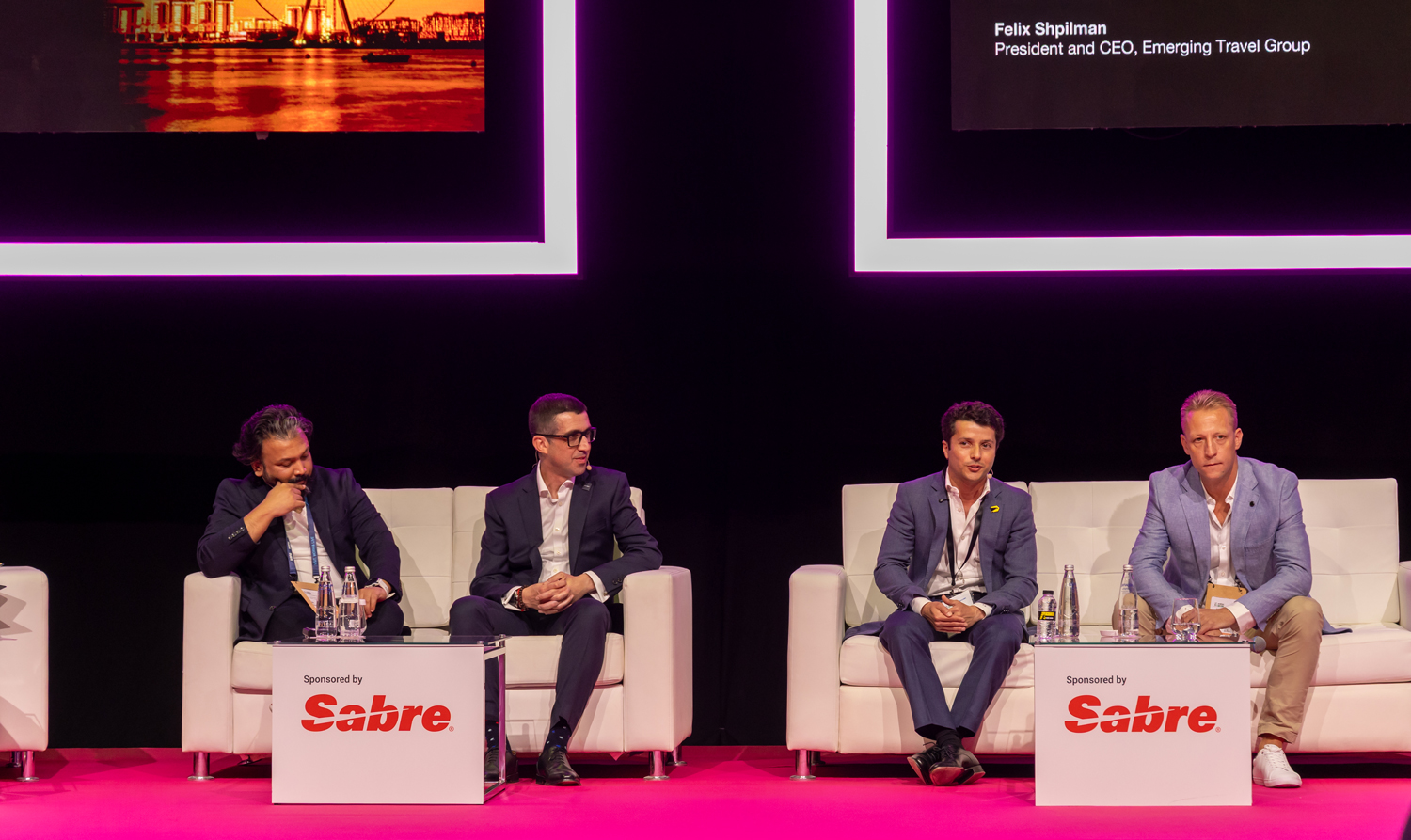The panelists grounded the discussion in real-world frustrations, but they didn’t dwell on problems. Shpilman himself brought his own complaints to the table, but quickly pivoted to offer his thoughts on how to fix the travel industry, from alleviating customers’ struggles with manual check-ins to hastening the snail-like rollout of new tech. He even laid out his optimistic vision for the AI-powered future of digital travel.
Anastasia Varnavskaya, founder of FATUDE, moderated a discussion that included a blockchain-based travel innovator, an M&A (mergers and acquisitions) analyst, and other hospitality veterans. These experts spent the entire hour focused on one goal: To offer a digital travel journey as effortless as the consumer deserves.
Contents
- The pain points modern tech still hasn’t fixed
- How blockchain can finally deliver secure payments and loyalty programs
- Empowered teams make smart tech work
- Follow the money: Investors are betting on smarter travel
- Smart partnerships. Hyper focus. No shiny object syndrome
- The next three years: Your personal AI assistant could do the booking for you
- Bringing it all together
Who we are
Emerging Travel Group is a global travel tech company with brands operating in over 220 source markets since 2010. Our customers include trade partners and individuals simply booking their hotels online. We have more than 3,300 employees spread across Europe, the Americas, the Middle East, the Asia-Pacific region, the CIS, and Africa.
Life is a journey from one country to another, from home to work, from childhood to adulthood. This grand adventure of life is complex, yet it becomes inspiring through travel and new experiences. At ETG, every journey from point A to point B is a chance to offer our clients freedom and meet their need for connection.
We aim to make this journey more rewarding and simpler, especially in conditions of uncertainty. The task is undeniably challenging but achievable, especially when our team of professionals ensures that we create, distribute, and operate the most convenient travel products.
The pain points modern tech still hasn’t fixed
The panel didn’t take long to highlight a familiar truth: despite its digital gloss, modern travel is anything but seamless. Moderator Anastasia Varnavskaya set the tone by recounting her own booking debacle — the evening before her flight to ATM Dubai 2025! Her prepaid hotel reservation up and disappeared. Poof! Three hours on the phone later, she resolved the issue, but the experience was exhausting and kept her from spending valuable time with her family.
“Maybe separately as companies they are very good,” she said, “but together they failed me as a customer.” It was a striking reminder that the systems powering global travel often break down.
The disconnect between platforms, providers, and people echoed across the panel.
It was a moment of digital déjà vu in an industry that should know better by now.
Virendra Jain (Founder & CEO, VIDEC Consultants Private Ltd.) offered a useful framework: the travel journey is a mix of pre-booking, booking, and post-booking phases, each with its own challenges. “There is a lot of anticipation and exuberance which goes into travel planning… but we live in a time wherein there is overabundance of information,” he said. “We need to figure out ways wherein we could have a layer of AI to streamline the whole shopping process.”

Felix Shpilman, CEO of Emerging Travel Group
The core issue? Fragmentation. Even basic itinerary changes are a thorn in the side of every consumer and provider. Shpilman, laid out the problem: [At ETG,] we have a B2B corporate travel management business called RateHawk, with which we serve small and medium businesses. Within RateHawk, 60 % of our underlying demand is business travel related. Well, business travel has a post-sale parameter called amendability, where either a name or date gets changed. Well guess what? We’re connected with 323 of the world’s best suppliers, industry specialists, and everybody who calls themselves [a] number one travel company on Earth. Out of these 323 companies, guess how many have amendability via the API (the interface through which one software system speaks with another) without [forcing] a cancel and rebook? Three. As basic a human need as changing plans is simply unmet.
If travel is to live up to its digital potential, AI and automation need to knit the whole process together. As it is, too often, they just present enhanced interfaces — the disappointing “digital gloss” on a broken system.

How blockchain can finally deliver secure payments and loyalty programs
For Sam Woolard (CEO, TRAVALA), the pain points that Varnavskaya and so many others have experienced are symptoms of a larger issue: outdated infrastructure that inhibits transparency, speed, and (ultimately) trust in the industry.
“The customer is often challenged with things like high transaction fees, credit card fees, cross-border transactions,” he noted. “And there’s a bit of a lack of transparency in that space.”
Emerging technologies like blockchain offer a path forward. While Woolard was careful to play down sensationalist crypto hype, he emphasized its potential to streamline secure payments. “The underlying technology is blockchain, which is actually much more secure and transparent,” he said. “It will eliminate things like additional fees that the customers are exposed to.”
He also highlighted growing mainstream adoption of crypto infrastructure. “Mastercard’s partnership with Kraken… allows people from the UK and Europe to pay with crypto in 150 million merchants worldwide,” he said. “PayPal had their own digital asset… and they allow users to buy and spend Bitcoin.”
Still, Woolard was candid about one of the biggest barriers to broader adoption: “There’s a lot of positive and negative news about crypto out there,” he said. “And one of the biggest challenges is actually the lack of education in this space.”
Although blockchain’s role in travel is yet to bloom fully, Woolard underscored the urgency for companies to explore its potential — not just for novelty’s sake, but to meet a digitally fluent customer base where it’s at.
Empowered teams make smart tech work
Even the smartest technology stumbles if it doesn’t work for the user. As several panelists made clear, the real challenge isn’t building a better system — hotel teams need to be equipped, trained, and motivated to use it.
Many properties are still wrestling with disconnected systems and inefficient manual workflows. “One Hilton is not the same as another Hilton,” Barreiros said. “They use different types of technology… but we expect the humans working in those entities to know everything about you when you walk in as a guest.”
Too often, those humans are left out of the loop. “Bring in the stakeholder that’s going to use that technology… from day one,” Barreiros urged. Otherwise, even great tools fall flat. Frontline staff should be part of the equation — not an afterthought.

Follow the money: Investors are betting on smarter travel
While much of the panel focused on streamlining the customer experience, Virendra Jain offered a broader perspective: follow the money. “Where M&A is happening is where the industry is either going — or is going to go,” he said.
Since the pandemic, travel tech investment has favored automation (including hardware), conversational AI, personalization, and UX (user experience) improvements. They represent where deals and funding are most active.
Jain cited a string of recent acquisitions that illustrate the industry’s current priorities: Vision-Box, acquired by Amadeus, is advancing biometric-powered airport experiences. Mews’ takeover of Nomi opened up new personalization capabilities. Amadeus also signaled demand for smarter, real-time travel insights by snapping up the date intelligence firm ForwardKeys.
This shift dovetails with the rise of AI as a revenue builder/cost reducer. Next-gen travel platforms will need to work smarter with things like predictive pricing and dynamic itineraries. And they need to do it while delivering more personalized experiences for travelers.
The panel sent a clear message to companies behind on digital transformation: watch where investors are placing their bets. The big firms are acquiring the future of travel.
Smart partnerships. Hyper focus. No shiny object syndrome
Ambition isn’t a problem for most modern companies. Focus is. Felix Shpilman captured the dilemma with a tasteful metaphor: “Many of our competitors or other players… are spreading it thinner than ever in a ‘peanut butter’ strategy.”
According to Shpilman, trying to do everything at once — new products, new markets, in-house tech — can cause organizational gridlock. “Everything becomes even slower,” he said. “No new features, and everyone [is] sitting and complaining about when are we going to put these new shiny things into customers’ hands.”
The solution, he argued, is ruthless prioritization and smarter partnerships. “People should really be thinking about what their core strengths [are] all the time,” he said. “And outsourcing whatever they can to good partners.”
Clarity of purpose matters, especially in a crowded tech landscape. Companies that resist distractions and invest in what will truly differentiate them are more likely to develop a substantial competitive advantage.

The next three years: Your personal AI assistant could do the booking for you
The panelists didn’t hesitate to opine about the future. They think the next few years will see a seismic shift. AI, blockchain, and hyper-personalization will transform booking, customer experience, and the memories consumers carry with them for years after their travel.

Felix Shpilman, CEO of Emerging Travel Group
Felix Shpilman predicted a total overhaul of the user interface:
Blockchain helps, for sure, but AI agents is what truly cures these problems. I have been building a personal AI agent for a couple of weeks now on weekends, and I already see fruits of that. And I cannot wait to see mass adoption… We will not have a city page and a hotel page. Everything will be voice-powered… and each one of us travelers will have an intelligent assistant in our pocket that works much better than Apple Intelligence today.
Jain echoed this shift toward conversational platforms, especially in younger markets like Saudi Arabia. “I think with the advent of AI we are looking at very different user interfaces: minimalistic interfaces, zero interfaces, which are completely conversational driven.”
Sam Woolard spoke to the evolving role of blockchain in marketing and loyalty. With access to on-chain behavioral data, travel companies will deliver hyper-targeted campaigns. “We can see what assets [customers] hold, when they last transacted, what blockchain they’re using,” he said. “So we can do hyper-personalized, targeted marketing… which we don’t really do through traditional channels.”
Finally, Custódio Barreiros offered his compelling vision for what the future should look like:
Ultimately, the future will have more automation, more flashy interfaces, more cutting-edge tech. But the panelists saw something more important — innovation aligned with real human needs. To get there, companies must rethink how customers book travel and how the industry supports them along the way.
Bringing it all together
We’ll reach the future of digital travel by building systems that serve real people, real journeys, and real business needs. The experts at ATM Dubai 2025 gave the whole industry some thought-provoking takeaways:
- Travel still feels broken because fragmented systems and legacy processes create friction at every stage of the journey.
- AI and automation can offer real solutions — but trained human teams must be ready to offer support.
- Blockchain infrastructure promises secure, fee-reducing transactions and smarter loyalty programs. Industry players need to provide education and build trust.
- M&A trends are pointing toward investment in personalization, automation, and traveler-centric UX. Watching the money lets us see what’s next.
- Focus, not flash, wins. Companies must prioritize core strengths, seek strong partners, and leave room for experimentation.
- The next era will be voice-first and hyper-personalized, driven by conversational AI agents, on-chain behavior data, and smarter interfaces.
As Felix Shpilman noted, transformation requires more than vision — it needs clear priorities and a commitment to progress. The companies that balance innovation with human connection will define the future of travel.


